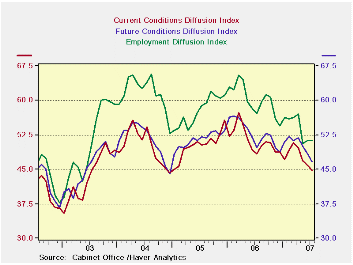 Global| Aug 08 2007
Global| Aug 08 2007Japan Economy Watchers Index in Steady Decline
Summary
Trends for Japans economy-watchers index have turned lower and remain in a downtrend after having made a local peak between February and April, depending on the series. Even this local peak is part of an ongoing downtrend for the [...]

Trends for Japan’s economy-watchers index have turned lower and remain in a downtrend after having made a local peak between February and April, depending on the series. Even this local peak is part of an ongoing downtrend for the indexes whose true cycle peak dates to early 2006. Japan’s policy markets do look at this index and it is considered reliable. One attribute of the index is that it is timely. The current and future portions of the index are turning lower and each displays three straight months of declines. The employment index ‘triggered the slide’ with a huge drop three months ago followed by two months of begrudging gains. The index does tell a reassuring story of Japan’s growth.
| Raw readings of each survey | Percent of 5Yr range* | ||||||
| Jul-07 | Jun-07 | May-07 | Apr-07 | Jul-07 | Jun-07 | May-07 | |
| Diffusion | |||||||
| Economy Watchers | 44.7 | 46.0 | 46.8 | 49.7 | 3.8% | 25.7% | 44.4% |
| Employment | 51.2 | 51.2 | 50.7 | 57.1 | 4.0% | 27.5% | 35.6% |
| Future | 46.7 | 48.4 | 50.0 | 51.9 | 21.4% | 34.9% | 52.9% |
Robert Brusca
AuthorMore in Author Profile »Robert A. Brusca is Chief Economist of Fact and Opinion Economics, a consulting firm he founded in Manhattan. He has been an economist on Wall Street for over 25 years. He has visited central banking and large institutional clients in over 30 countries in his career as an economist. Mr. Brusca was a Divisional Research Chief at the Federal Reserve Bank of NY (Chief of the International Financial markets Division), a Fed Watcher at Irving Trust and Chief Economist at Nikko Securities International. He is widely quoted and appears in various media. Mr. Brusca holds an MA and Ph.D. in economics from Michigan State University and a BA in Economics from the University of Michigan. His research pursues his strong interests in non aligned policy economics as well as international economics. FAO Economics’ research targets investors to assist them in making better investment decisions in stocks, bonds and in a variety of international assets. The company does not manage money and has no conflicts in giving economic advice.
More Economy in Brief
 Global| Feb 05 2026
Global| Feb 05 2026Charts of the Week: Balanced Policy, Resilient Data and AI Narratives
by:Andrew Cates






